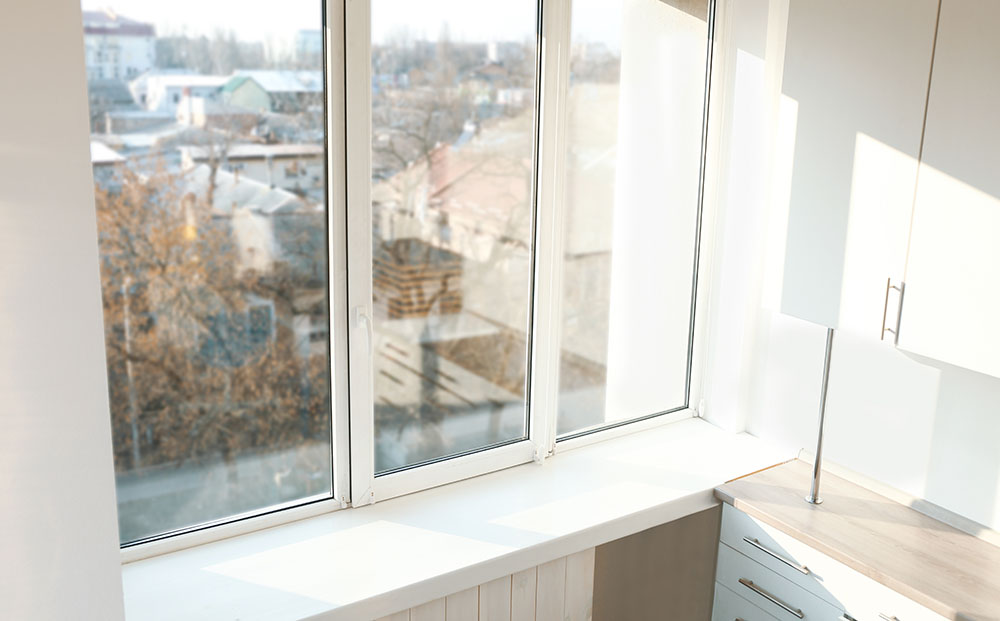Do Double Glazed Windows Prevent Mould?

CONTENTS
- The science of mould growth in indoor environments
- Double-glazed windows: an overview
- Insulation and its impact on mould prevention
- Humidity levels and their relation to mould proliferation
- Ventilation strategies with double-glazing
- Indoor air quality enhancement with double-glazing
- The cost benefits of double-glazed windows for mould prevention
- Frequently asked questions
- Get in touch
Double-glazed windows are a barrier against the cold and a key defence against mould. These windows keep your property comfortable, but their role in maintaining dry, healthy interiors is overlooked. Dampness leads to mould, but with double glazing, you make it hard for spores to settle.
If you are struggling with damp or mould in your home, our team at ICE Cleaning can step in. Our mould remediation services are industrial-grade and high-quality, ensuring the best results for you and your property, commercial or domestic.
Read on to learn about the science behind indoor mould growth and how upgrading to double-glazed windows can improve air quality and health.
The science of mould growth in indoor environments
Mould thrives where it is damp and warm, making our homes perfect breeding grounds. It starts as a microscopic spore floating in the air; when these land on wet surfaces, they grow into unsightly black spots.
Mould needs water to germinate and spread, while high humidity gives mould spores the ideal wet conditions they crave for growth. Temperature also contributes as most types of mould favour temperatures that are comfortable for humans - around 20°C to 30°C.
This is due to biological processes generally speeding up as things get warmer - including those within growing mould colonies.
Lastly, your home provides food for mould thanks to organic materials like wood, paper or cotton. These food sources are broken down into digestible sizes by enzymes - secreted by the mould.
Double-glazed windows: an overview
Double-glazed windows are made up of two layers of glass separated by an air gap to form an insulating barrier, defending against energy loss. This setup keeps warm indoors and is also pivotal in reducing condensation.
By maintaining a consistent surface temperature, it reduces the likelihood of mould spores forming due to water vapour. Moreover, this innovation has evolved with advancements such as Low-E coatings, which reflect heat into the room while allowing light in – further enhancing their protective role.
Insulation and its impact on mould prevention
Mould thrives in damp, poorly insulated environments. It is a growth that creeps into homes and businesses, causing various problems. But with proper insulation, it acts as a barrier, keeping heat consistent throughout your property.
Double-glazed windows shield against mould growth because their design features two layers of glass, with an inert gas sandwiched between them. This setup significantly reduces moisture build-up on interior surfaces by limiting condensation when temperatures drop outside.
Stable indoor temperatures mean less risk for spores to settle down and multiply. Although double glazing might cost you more upfront, it ensures healthier living spaces, reduced energy bills, and less risk of mould.
Humidity levels and their relation to mould proliferation
Maintaining humidity levels is key in the fight against mould. Double-glazed windows play a pivotal role here, as they help keep indoor humidity at bay. Too much moisture indoors can result in damp, eventually leading to mould. But with double glazing, unwanted dampness cannot get in that easily.
Properly sealed double-glazed units create a barrier that limits condensation if not managed. This way, you can prevent mould and maintain a comfortable environment indoors.
Studies have shown that controlling indoor moisture reduces allergen levels related to damp-sensitive mites and fungi. Therefore, investing in quality double glazing can also create healthier living spaces.
Ventilation strategies with double-glazing
Double-glazed windows keep homes comfortable, but without proper ventilation, they can unwittingly host damp and mould. It is crucial to strike a balance between insulation and airflow.
To keep the air fresh and humidity in check, trickle vents are additions you can install on your double-glazed windows. They let air circulate constantly, even when windows are shut.
Pairing these with intermittent fan use ensures moist air from cooking or showering does not settle and feed mould spores.
Another strategy is heat recovery ventilators (HRVs). These devices draw indoor air out while pulling fresh outdoor air in, passing it through a core that swaps the heat before pushing out the old airstream, creating healthier homes and maintaining warmth without creating condensation.
Indoor air quality enhancement with double-glazing
Double-glazing is a highly effective way of improving indoor air quality. By trapping a layer of air between two panes of glass, they create an insulating barrier against outdoor pollutants.
These sealed windows can reduce condensation, which is often a breeding ground for mould spores that can affect your health by contributing to lower air quality.
While double glazing might be invisible in its day-to-day operations, its impact on clean breathing spaces within our property and workplace is integral.
The cost benefits of double-glazed windows for mould prevention
When considering an investment in double-glazed windows, it is essential to consider their efficiency against the costs involved. Although they can be more costly upfront than single-pane options, they could save you money and hassle in the long run by fighting off mould.
Double-glazing cuts down this moisture-rich environment where mould spores are drawn by reducing condensation on interior glass surfaces. With double-glazed windows, you are investing in a drier and healthier home atmosphere.
Properties with these insulated units see reduced energy bills and better heat retention — upwards of 10-12% annually. While your initial payment may seem steep, eventually your savings grow, heating costs decrease, and you are less likely to see mould.
Frequently asked questions
What can I put on my windows to prevent mould?
To keep mould at bay, try using anti-mould sprays or gels specifically designed for window frames and sills.
Do double-glazed windows prevent mould?
Yes, they do. Double glazing helps reduce condensation - a breeding ground for mould spores.
How do I stop mould from growing on my windows?
To prevent mould growth, it is important to maintain dryness. You can also use moisture-absorbing products and clean your windows regularly using fungicidal washes.
Should you open windows to prevent mould?
Regularly airing out your home can help to reduce humidity levels indoors.
Get in touch
At ICE Cleaning, we offer thorough mould cleaning services, ensuring all traces of mould and spores are cleaned from your property. We provide professional guidance to help you keep your home mould-free and dry.
To learn more about our mould removal services, get in touch with our team at 0208 066 0360 or enquiries@icecleaning.co.uk. We operate nationwide, 24/7, 365 days a year, offering emergency cleaning on the same day for extreme cases of mould proliferation.

Speak with me today,
I’m here to help
By asking you a few questions either via phone or email I can immediately provide a realistic estimation of the cost.
You’re in good company. We’ve cleaned for the following commercial clients… View all

Why choose us?
- Cater to a wide variety of cleaning situations
- Nationwide coverage, available 24/7
- Cater to commercial and domestic clients
- Free survey provided prior to quotation
- Emergency response team
- Offer a bespoke service designed to suit all your needs
- All technicians hold professional health and safety qualifications, including BICSc, IOSH, Dewpoint Professional & Safe Contractor
We’re fully accredited
We place best practise, professional expertise and health and safety at the core of our business. We’re fully compliant with all legal obligations. You can view a list of our accreditations below, or visit our Health & Safety page for more information.











-RGB-small.1707319151.jpg)




















